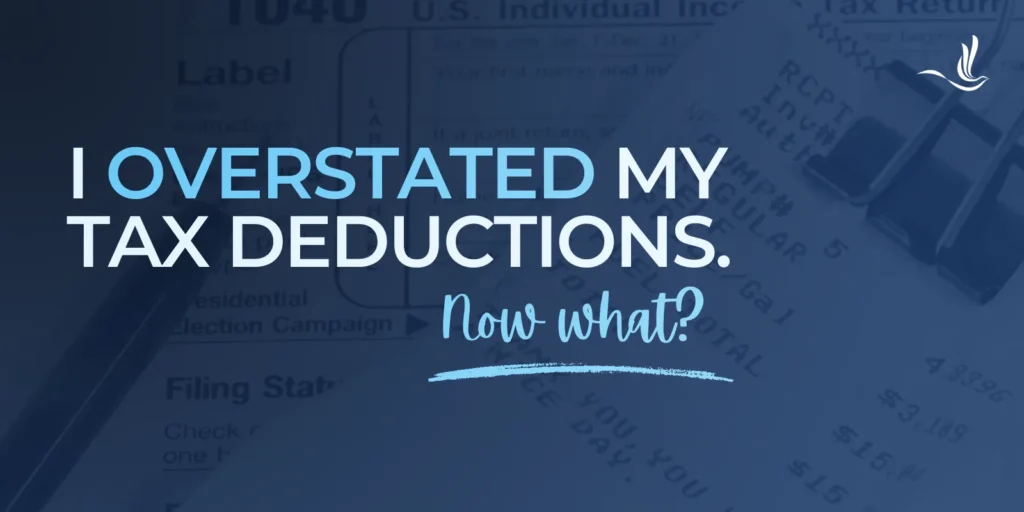It’s easy to make mistakes when filing taxes, especially when it comes to deductions. You might accidentally overstate your tax deductions, either due to a misunderstanding of tax laws, incorrect records, or an inadvertent miscalculation. The IRS takes incorrect tax returns seriously, so it’s essential to understand what happens when you overstate your deductions and how to address the situation effectively.
Possible Scenarios Leading to Overstated Deductions
There are several ways to overstate tax deductions. One is to incorrectly classify your expenses. Suppose you claim personal expenses as business deductions. Maybe you used your car for both personal and business purposes but deducted the entire vehicle cost as a business expense. Another is to overestimate charitable donations. Additionally, if you deduct more square footage of your home than is truly used for business purposes or include unrelated home expenses, you could overstate this deduction. One other example is claiming ineligible expenses. For instance, trying to deduct commuting expenses as business travel or taking deductions for meals and entertainment that don’t meet IRS requirements can also lead to overstatements.
There are quite a few consequences to overstating tax deductions and they range from minor to major.
Delayed Refunds or Adjustments
Overstating tax deductions can lead to delays in processing your tax return. If the IRS identifies discrepancies, it may put your refund on hold until the matter is resolved. This can be particularly stressful if you are counting on that money.
Impact on Future Tax Filings
When the IRS adjusts your return due to overstated deductions, it can have long-term implications. You’ll be on the IRS’s radar for future returns, and your filing history may receive additional scrutiny. Furthermore, if you’re a business owner, repeated errors can jeopardize your credibility and business standing.
IRS Audit Risk
One of the most immediate risks of overstating deductions is the possibility of triggering an IRS audit. While many tax returns are processed without additional scrutiny, certain red flags can increase your chances of being audited. The IRS uses algorithms and statistical models to identify suspicious returns, and inflated deductions are a common cause for investigation. If your return is flagged, the IRS may request documentation to substantiate the deductions claimed. Depending on the outcome of the audit, the IRS could adjust your return, resulting in additional taxes owed, interest, and penalties.
Penalties and Interest
When deductions are overstated, and the IRS recalculates your tax liability, you’ll owe more than you originally paid. Beyond the additional tax amount, the IRS imposes penalties and interest, which can add up quickly. For example, you can be hit with accuracy-related penalties. This penalty is 20% of the underpaid tax amount if the IRS finds that the error was due to negligence or a substantial understatement of income tax. A “substantial understatement” typically means the amount understated exceeds the greater of 10% of the correct tax liability or $5,000.
If the IRS determines that you intentionally overstated deductions to evade taxes, the consequences are more severe. The civil fraud penalty is 75% of the underpaid tax. This means if you owe $50,000 in additional taxes because of fraudulent deductions, the penalty could be $37,500. The IRS also charges interest on any unpaid taxes starting from the original due date of the return. The current interest rate for underpayments is 8%.
Potential for Criminal Charges
While rare, the IRS can pursue criminal charges if they believe you willfully committed tax fraud. This can happen when a taxpayer knowingly falsifies information on their return, such as inflating deductions to reduce taxable income. It can also happen when a taxpayer shows repeated patterns of overstating deductions on multiple tax returns or if they hide income while inflating deductions to evade taxes.
Solutions for Overstated Deductions
The consequences can be intimidating, but there are solutions for overstating tax deductions.
Amend Your Tax Return
The most straightforward way to correct overstated deductions is to file an amended tax return. You can do this using Form 1040-X, Amended U.S. Individual Income Tax Return. Here’s what to consider:
- Timing: You have three years from the original filing date or two years from the date you paid the tax, whichever is later, to file an amended return.
- Documentation: Attach proper documentation for the corrected deductions to show why the original figures were incorrect and how you’ve calculated the new numbers.
Pay Any Additional Tax Owed Promptly
If amending your return results in additional taxes owed, pay the amount as soon as possible to minimize interest and penalties. The IRS charges interest on unpaid taxes starting from the due date of the original return.
How to Avoid Overstating Deductions in the Future
You can avoid overstated tax deductions by using reliable tax software or a tax professional. Tax software can help you avoid common mistakes, but if your situation is complex, hiring a tax professional may be worth the investment. Remember, you are responsible for tax filing errors, even if you hired someone else to do your taxes for you. Finding a knowledgeable and reliable tax professional is crucial to avoiding mistakes like this.
Be clear about which expenses qualify for business deductions and which do not. The IRS provides detailed guidelines for various types of expenses. Be sure to double-check your records throughout the year, not just at tax time, to ensure accuracy and consistency. Finally, make sure you stay up to date on tax laws as they can change from time to time. For instance, the Tax Cuts and Jobs Act of 2017 made significant changes to itemized deductions, so it’s crucial to stay informed.
Tax Help for Those Who Owe
Overstated tax deductions can lead to significant headaches, but it’s not the end of the world. By amending your return, paying any additional tax owed, and learning from your mistakes, you can get back on track. Taking a proactive approach to managing your tax obligations will help you avoid future errors and ensure your peace of mind. Optima Tax Relief has over a decade of experience helping taxpayers get back on track with their tax debt.
If You Need Tax Help, Contact Us Today for a Free Consultation
Publisher: Source link











